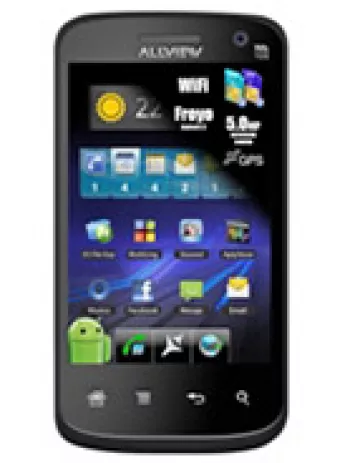
Overview of Allview P1 AllDro
The Allview P1 AllDro, introduced in October 2011, was a technological marvel of its time. With features that catered to the needs of early smartphone users, the device presented a comprehensive mobile experience. Despite its discontinuation, the Allview P1 AllDro remains a noteworthy piece for those passionate about technology evolution.
Network Features
Equipped with GSM technology, the Allview P1 AllDro was designed to operate smoothly on GSM 900 and 1800 bands, catering to users for basic voice and SMS functionalities. The device offered HSPA speeds which, during its period, were considered relatively fast for accessing the internet, downloading apps, and streaming content.
Launch and Availability
Upon its announcement and release in October 2011, the Allview P1 AllDro captured attention as an accessible entry-level smartphone. While it is now discontinued, the device once provided a sturdy option for users transitioning from traditional phones to smarter technologies.
Body and Design
The Allview P1 AllDro featured a compact design with dimensions of 115.9 x 62 x 12.9 mm, making it easily portable and comfortable for one-handed use. Weighing just 119 grams, it was relatively light, ensuring ease of carry without compromising on build quality. Its dual SIM capability allowed users flexibility in managing multiple network connections.
Display Specifications
The device sported a 3.5-inch TFT display with a resolution of 320 x 480 pixels, delivering a pixel density of about 165 ppi. Although modest by today’s standards, the display was sufficient for basic tasks such as reading messages, browsing the web, and viewing photos.
Platform and Operating System
The Allview P1 AllDro ran on Android 2.2 (Froyo), a popular choice at the time for budget smartphones. This operating system provided users access to a variety of applications via the Google Play Store, enhancing the device's usability and making it a gateway into the smartphone ecosystem.
Memory and Storage
The device came with 512MB of internal storage paired with 256MB of RAM, which allowed for basic multitasking capabilities. For users needing more space for apps, photos, and other media, the presence of a microSDHC card slot provided expandable storage solutions, tremendously increasing its versatility.
Camera Capabilities
The main camera was a 5MP shooter with autofocus capabilities and complemented by an LED flash. It could capture videos at 480p at 30fps, suitable for casual photo-snapping and video recording. The VGA front-facing camera was included for video calls, though it was basic and best used in well-lit conditions.
Sound and Audio
The Allview P1 AllDro included a loudspeaker for hands-free calls and audio playback, which was a standard yet important feature. The lack of a dedicated headphone jack meant that users must rely on the loudspeaker or compatible Bluetooth headsets for audio needs.
Connectivity Options
This device offered essential connectivity options including Wi-Fi 802.11 b/g for internet access, and Bluetooth 2.1 for pairing with other devices. GPS was integrated for basic location services, although more advanced functionalities such as NFC and Radio were absent.
Sensors and Additional Features
Key sensors included an accelerometer and a proximity sensor, providing functionalities like auto-rotate and screen autosleep to enhance user experience. These features were crucial in optimizing battery life and providing intuitive operation.
Battery Life
Powered by a 1500 mAh removable Li-Ion battery, the Allview P1 AllDro offered a balanced trade-off between usability and battery lifespan. Stand-by time was approximately 220 hours, with up to 5 hours of talk time, adequately supporting daily activities for light users.
Final Thoughts
Though the Allview P1 AllDro has been discontinued, it remains a key player in the history of smartphones. Its practical features and design appealed to a broad audience looking for an affordable, reliable device during its time. As technology continues to evolve, devices like the Allview P1 AllDro underline the rapid advancement in mobile technology, reminding us of the competencies and limitations of early smartphones.
Key Features of Allview P1 AllDro
- Dual SIM support for managing two phone numbers
- Compact size with dimensions of 115.9 x 62 x 12.9 mm
- Lightweight design, weighing only 119 grams
- 3.5-inch TFT display for a balanced viewing experience
- Expandable storage via microSDHC card slot
- 5 MP main camera with autofocus and LED flash
- Wi-Fi connectivity for internet access
- GPS support for navigation
- Removable 1500 mAh battery for easy replacement
Disadvantages of Allview P1 AllDro
- Discontinued model with outdated technology.
- Limited cellular network technology, only GSM.
- Low screen resolution and pixel density (~165 ppi).
- Runs on obsolete Android 2.2 (Froyo) OS.
- Very limited internal storage (512MB) and RAM (256MB).
- Basic camera capabilities with 5 MP main and VGA selfie camera.
- No NFC support.
- No radio functionality included.
- Old Bluetooth version (2.1).
- Low battery capacity (1500 mAh) with limited usage time.
- Limited Wi-Fi connectivity (only supports 802.11 b/g).
View Also
More Phones
All Rights Reserved +14266 Phones © Mobilawy 2025

























